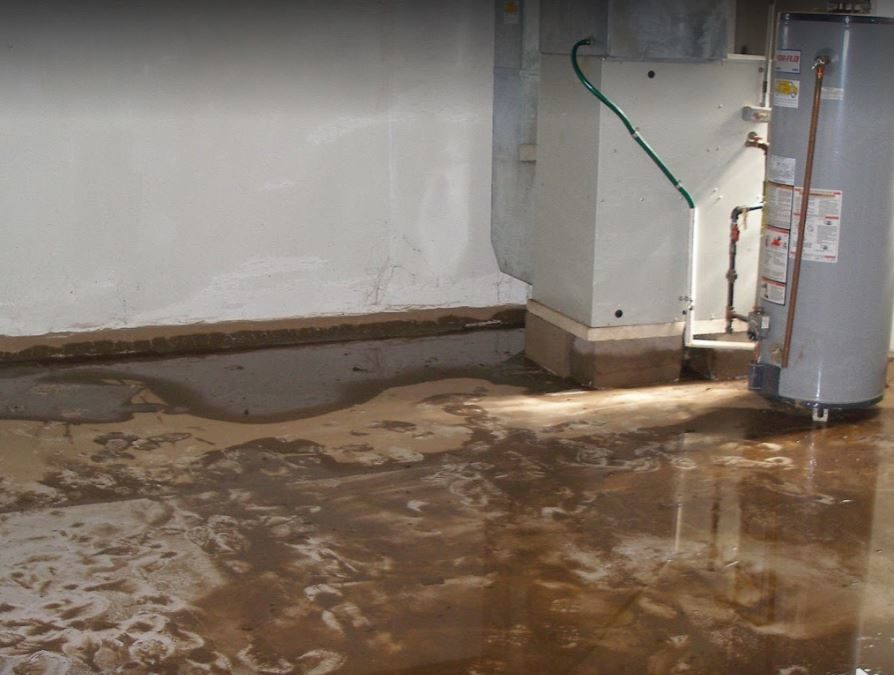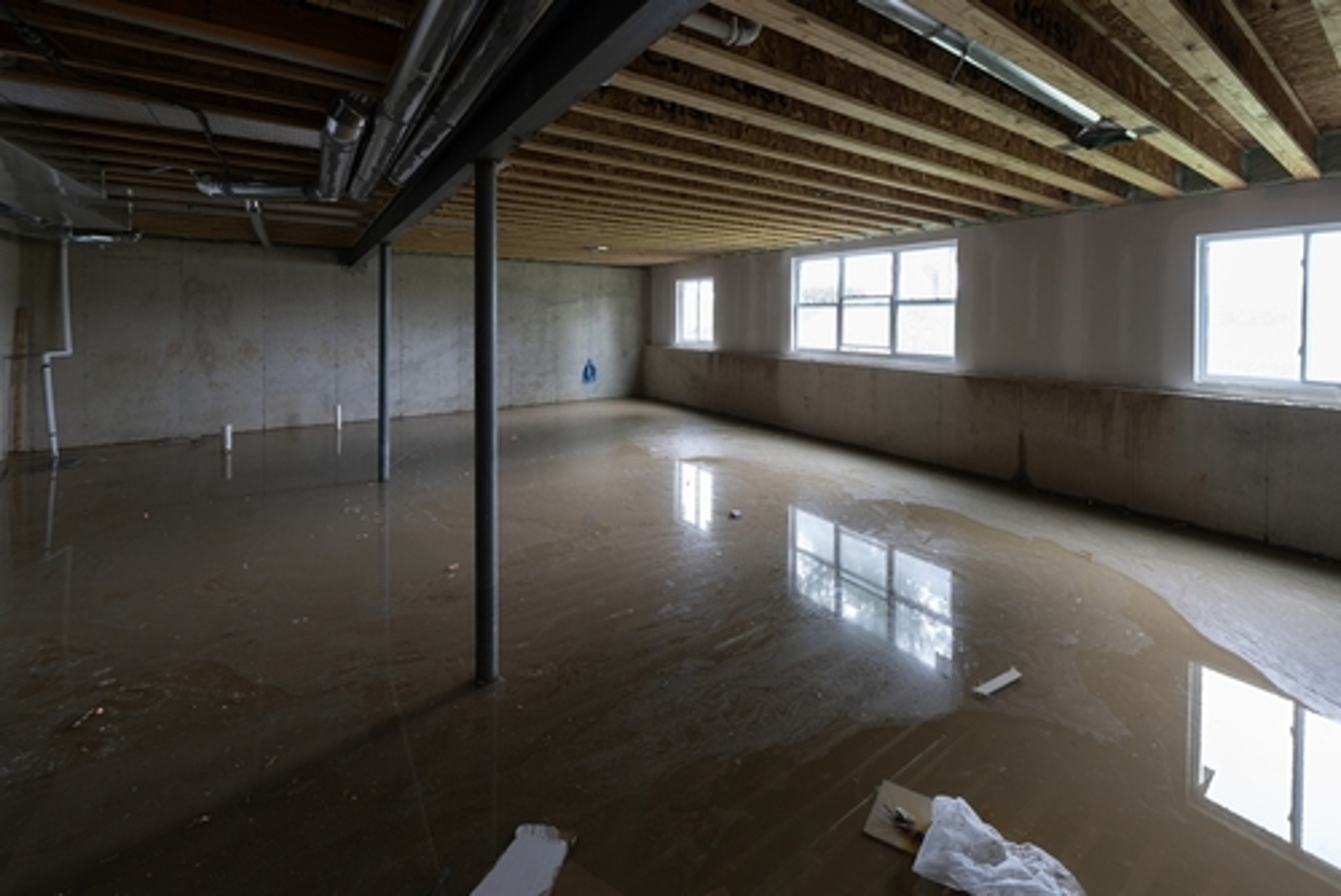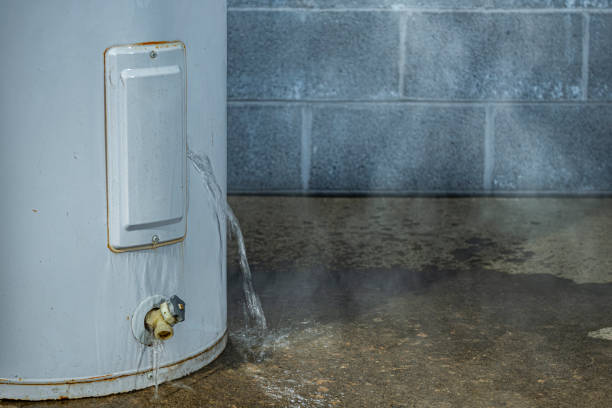
Why Does Your Basement Flood When It Rains?
Understanding why your basement floods during rainstorms is key to preventing future issues. Here are some common reasons why water might be seeping into your basement:
1. Poor Drainage Around the Foundation
One of the most common causes of basement flooding is poor drainage around the home’s foundation. If your gutters and downspouts are clogged or not directing water away from the house, rainwater can pool around the foundation, eventually finding its way into your basement.
2. Foundation Cracks
Cracks in your home’s foundation can allow water to seep into your basement. These cracks may be caused by settling, pressure from water-saturated soil, or temperature fluctuations that cause the foundation to expand and contract. Over time, even small cracks can lead to significant water intrusion.
3. High Water Tables
In areas where the water table is naturally high, heavy rains can cause groundwater levels to rise above the basement floor, leading to water infiltration. This is especially common in homes built on low-lying land or near bodies of water.
4. Sump Pump Failure
Sump pumps are designed to remove excess water from your basement, but if your pump fails during a storm or power outage, water can quickly accumulate. Regular maintenance of your sump pump is essential to avoid sudden malfunctions when you need it most.
For more information on common causes of basement flooding, check out this guide from Family Handyman.
What to Do Immediately After Your Basement Floods

When you discover a flooded basement, it’s important to act quickly to minimize damage and prevent long-term issues like mold growth. Follow these steps to safely clean up and dry out your basement:
| Step | What to Do |
|---|---|
| 1. Turn Off the Power | If your basement has standing water, the first step is to turn off the electricity to the area to avoid the risk of electric shock. If the circuit breaker is located in the basement, do not enter the water—call an electrician for assistance instead. |
| 2. Remove Standing Water | Once it’s safe to enter the basement, use a wet/dry vacuum, sump pump, or buckets to remove standing water. If the flooding is significant, consider renting a water pump to expedite the process. The quicker you remove the water, the less damage your basement will sustain. |
| 3. Dry the Basement | After removing the water, it’s important to dry out the basement as quickly as possible to prevent mold. Use fans, dehumidifiers, and open windows to promote airflow. If possible, remove any wet carpeting, furniture, or drywall to prevent mold growth. |
| 4. Clean and Disinfect | Floodwater can carry bacteria, sewage, and other contaminants. Use a mixture of bleach and water (one cup of bleach per gallon of water) to disinfect surfaces that came into contact with the floodwater. Wear gloves, boots, and a mask to protect yourself during the cleanup process. |
| 5. Check for Structural Damage | Flooding can weaken the structural integrity of your home, especially if it happens frequently. Inspect your foundation, walls, and floors for cracks, bulging, or other signs of damage. If you’re unsure, it’s best to call a professional to assess the situation. |
| 6. Prevent Mold Growth | Mold can begin to grow within 24-48 hours in damp environments, so it’s crucial to dry out your basement thoroughly. If you notice signs of mold or suspect that mold is present, contact a mold remediation professional like Citywide Mold Mitigation to safely remove the mold and prevent further damage. |
Following these steps can help minimize the damage caused by basement flooding and reduce the risk of long-term issues like mold, mildew, and structural damage.
How to Prevent Your Basement from Flooding in the Future

1. Improve Drainage Around Your Home
Ensure that your home’s gutters and downspouts are clean and in good condition. Downspouts should direct water at least 5-10 feet away from your home’s foundation. Consider installing a French drain or grading the soil around your home to improve water drainage and prevent pooling near the foundation.
2. Seal Foundation Cracks
If your foundation has cracks, seal them with hydraulic cement or a waterproof sealant to prevent water from seeping into your basement. For larger cracks, it’s best to call a foundation repair specialist to assess and fix the issue properly.
3. Install a Sump Pump
If your home is prone to basement flooding, consider installing a sump pump to remove excess water during heavy rains. For added protection, install a battery backup system to ensure the pump continues working during power outages.
4. Waterproof Your Basement
Waterproofing your basement can provide an extra layer of protection against flooding. This may include applying a waterproof coating to basement walls, installing a vapor barrier, or adding a perimeter drainage system to keep water out.
5. Install a Backwater Valve
If your basement flooding is caused by sewer backups, consider installing a backwater valve to prevent sewage from flowing back into your home. This valve is designed to automatically close when it detects a reverse flow in your pipes, protecting your basement from contamination.
For more in-depth information on preventing basement flooding, check out this guide from This Old House.
When to Call Citywide Mold Mitigation for Help
If your basement floods frequently or if you’re dealing with significant water damage or mold growth, it’s time to call in the professionals. Water damage can lead to long-term structural issues, and mold can pose serious health risks if left untreated. Citywide Mold Mitigation provides expert mold removal, water damage restoration, and flood prevention services to help keep your home safe and dry. Contact us today to schedule an inspection and protect your home from future basement flooding.
FAQ
| Question | Answer |
|---|---|
| Why does my basement flood every time it rains? | Your basement may flood during rainstorms due to poor drainage, cracks in the foundation, high water tables, or a malfunctioning sump pump. Identifying the source of the water intrusion is key to preventing future flooding. |
| What should I do immediately after my basement floods? | After turning off the power, remove standing water, dry the area, clean and disinfect affected surfaces, and inspect for structural damage. Quick action is essential to prevent mold growth and further damage. |
| How can I prevent my basement from flooding again? | You can prevent basement flooding by improving drainage, sealing foundation cracks, installing a sump pump, and waterproofing your basement. Regular maintenance of gutters, downspouts, and sump pumps is also important. |
| How quickly does mold grow after a flood? | Mold can begin to grow within 24-48 hours in damp environments. Drying out your basement and addressing any water issues as soon as possible is crucial to preventing mold growth. |
| When should I call a professional for basement flooding? | If you’re dealing with significant flooding, mold growth, or structural damage, it’s best to call a professional like Citywide Mold Mitigation for expert water damage restoration and mold removal services. |
If your basement has flooded, reach out to Citywide Mold Mitigation for professional help with water damage restoration and mold remediation today.

